I recently read a Richard Hanania article titled "Eating Animals and the Virtues of Honesty." It talks about the moral atrocity that is factory farming and how that relates to Hanania's personal dietary choices. I commend him for calling out how bad most animal agriculture is.
Hanania understands that there is no excuse to torture so many sentient beings just because we like how they taste. He concedes it could very well be one of the worst crimes in human history. Given all that, he wishes he could be vegan.
Unfortunately, he must continue to eat animals. If he stops, he will ruin his body composition:
I just grant to the vegan that he has won the argument, and he is morally superior from a utilitarian perspective, but I want to be thin and have broad shoulders.
His argument, as I understand it, boils down to the idea that he needs to eat animals in order be fit, strong, and healthy.
His position made me think of these great tweets:
I am tempted to poke fun at Hanania, but I used to have the exact same worry! So I am going to do the ethical thing and talk about my personal experience as a jacked vegan.
I know it's easy to google “vegan weightlifter” or "vegan athlete" or visit r/veganfitness to find examples vegans with shoulders so broad they'd make Hanania weep.
My goal with this post is to normalize the idea that even late 30’s, tech working, regular guy vegans can be muscular and healthy.
Sorry if this comes across as bragging, or if it's cringey. It just struck me while reading the Hanania piece that more people might go vegan if they felt they could do so without withering away. I want Hanania to know he can have his cake and eat it too! Were he to internalize that, how many people amongst his large audience could he influence to change their diets? How much suffering could he reduce?
I don't think it would be easy, possible, or desirable for every vegan to have big muscles. Nor do I think that a fully vegan diet is the healthiest choice for everyone. All I'm saying is that if what's holding you back from going vegan is a deep rooted fear that doing so will cause you to have small shoulders, I think you should reconsider.
Going vegan, maintaining my strength
When I first considered going vegan, I was also worried I'd become thin and weak. I'd read Stephan Guyenet's account of going vegan for 6 months. He struggled a lot, and it really gave me pause.
Old friends who came to visit during that period did repeatedly ask me if I was sick, because of the amount of weight I had lost-- largely muscle. I had grown paler as well.
Health and strength are priorities for me. I didn't want to become pale and frail. But after I got my first puppy I decided that I could no longer tolerate the idea of eating other sentient beings, so I stopped.

I went vegetarian for a month, then vegan. I figured I could always start eating meat again if my body fell apart.
The whole getting pale and weak thing just…didn’t happen to me. At all. I kept expecting to lose weight, or at least lose muscle, but I never did.
I have actually gained some muscle and weight over my 4 years as a vegan, while keeping to roughly the same workout routine. Maybe I'm just lucky. Or maybe the loudest voices online are the ones who either had a bad experience going vegan or are convinced they will if they try. Maybe it's not as hard as everyone makes it out to be.
Here's me just before going vegan:

And here I am after years of eating vegan:


At 36, I can currently bench and squat more than when I was an avid meat eater in my early twenties.
But am I destroying my health?
To dispel the notion that I am only superficially healthy, I'll share some bloodwork. This section can also serve as an n=1 response to the forum post about veganism entailing health tradeoffs.
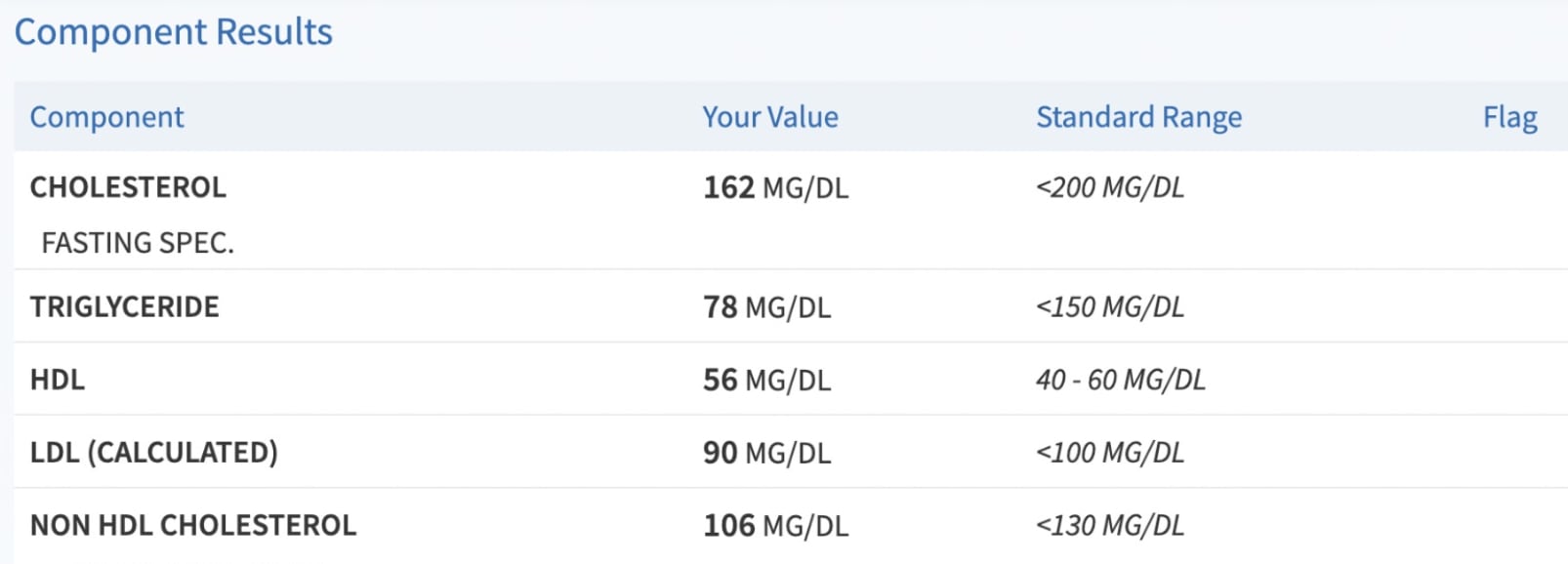
My numbers look fine, according to the physicians who evaluated my blood test results from two different sets of testing in the last 18 months. (If I'm wrong about this please let me know so I can make some changes!)
One doctor did note that I have slightly elevated creatinine levels. From what I understand that can be caused by creatine supplementation and doesn't actually imply poor kidney function. It is something I want to keep an eye on though.
Also my red blood cell count (RBC, second line) tends be in the very low end of the range, which doesn't seem ideal.
But my red blood cells were just as low back in 2015, when I was certain that eating beef liver at least twice per week was the key to health. Also, apparently my white blood cell count was out of whack back then? 🤷
Caveat — I exercise a lot
I enjoy working out and playing sports. It will certainly be tougher, if not impossible, to get jacked without living an active lifestyle.
My workout routine varies. I'd guess I do a higher intensity workout, such as running, playing basketball, or strength training, 3 to 4 days per week. My workouts tend to last about 45 minutes. My one consistent thing is that I do around 80 pushups a day.
I also walk my dogs an absurd amount, if that counts for anything.
Maybe my activity level represents an intolerable or impractical amount of working out for some people. Which is totally fair! Though I do think you can be plenty strong doing quite a bit less than I do.
I also take a few supplements — B12, creatine, omega 3's, the occasional iron and iodine pill.
Some other stray points that could make me an outlier:
- I think I put on muscle easier than the average person. Maybe it's all a genetic luck of the draw, and most vegans will struggle a lot more than me?
- 4 years as a vegan is not a lot of time in the grand scheme of things. I can't rule out that something is going wrong beneath the hood that will only be revealed after longer periods of time.
- For my first year of veganism I was a "bivalve vegan" — I ate muscles, clams, and oysters. Maybe that specific protein base set me up for a successful transition.
- I did not notice any brain fog, irritability, or poor mental performance after becoming vegan. I know that happens to some people, which sucks. Could this imply I am somehow particularly well suited to this diet both mentally and physically?
- I stopped drinking alcohol shortly before I went vegan
What I eat
I don't think that much about what I eat, besides trying to somewhat limit my intake of junk food.
I am certainly not achieving muscle growth through some kind of targeted, lean protein filled diet. I think I'm a healthy eater overall, but I basically eat whatever I want, and I eat huge portions.
I also weigh 205 pounds, so I'm not lean per se, I just don't have a lot of body fat. (I'm 6 feet tall)
I am not a foodie by any means, which I think made it easier for me to go vegan. I love to eat, but I am happy if what I eat is basically slop.
A typical day of eating is something like:
Breakfast: giant bowl of oatmeal with peanut butter and protein powder
Lunch: rice/potatoes/pasta, canned beans, tofu, pasta sauce, miscellaneous snacks from Trader Joes, fruit
Dinner: some kind of plant based meat, some kind of starch, a side of broccoli, a peanut butter and jelly sandwich, some cookies for dessert
I don't dine out that often, but when I do it's usually Chinese, burgers, Thai, or Mexican.
Hanania says that part of the reason he can't stop eating meat is because he would overeat if he didn't:
A diet filled with meat is the only one that can provide what I find to be an acceptable calorie-to-protein ratio while allowing me to avoid overeating.
He knows his body better than I do. But I find it hard to believe that this is an insurmountable obstacle.
I don't track my calorie to protein ratio, nor do I know what a good one is supposed to be. I do know that tofu is a pretty lean, low calorie protein source. As are beans. I defy anyone to overeat a bowl of tofu and beans.
Get strong for the cause
Many people I know are vegan curious these days. And much like Hanania and myself, a lot of them are worried that their health and fitness will suffer if they give it a shot. If you are fortunate enough to have the ability to become a conspicuously strong vegan who is also genuine, enthusiastic, and non-preachy, you have the opportunity to dispel people's worries.
As trivial as it sounds, these interactions can make a difference. According to one survey, the second biggest reason people cite for considering veganism (after watching documentaries) is having a conversation with a friend or family member.
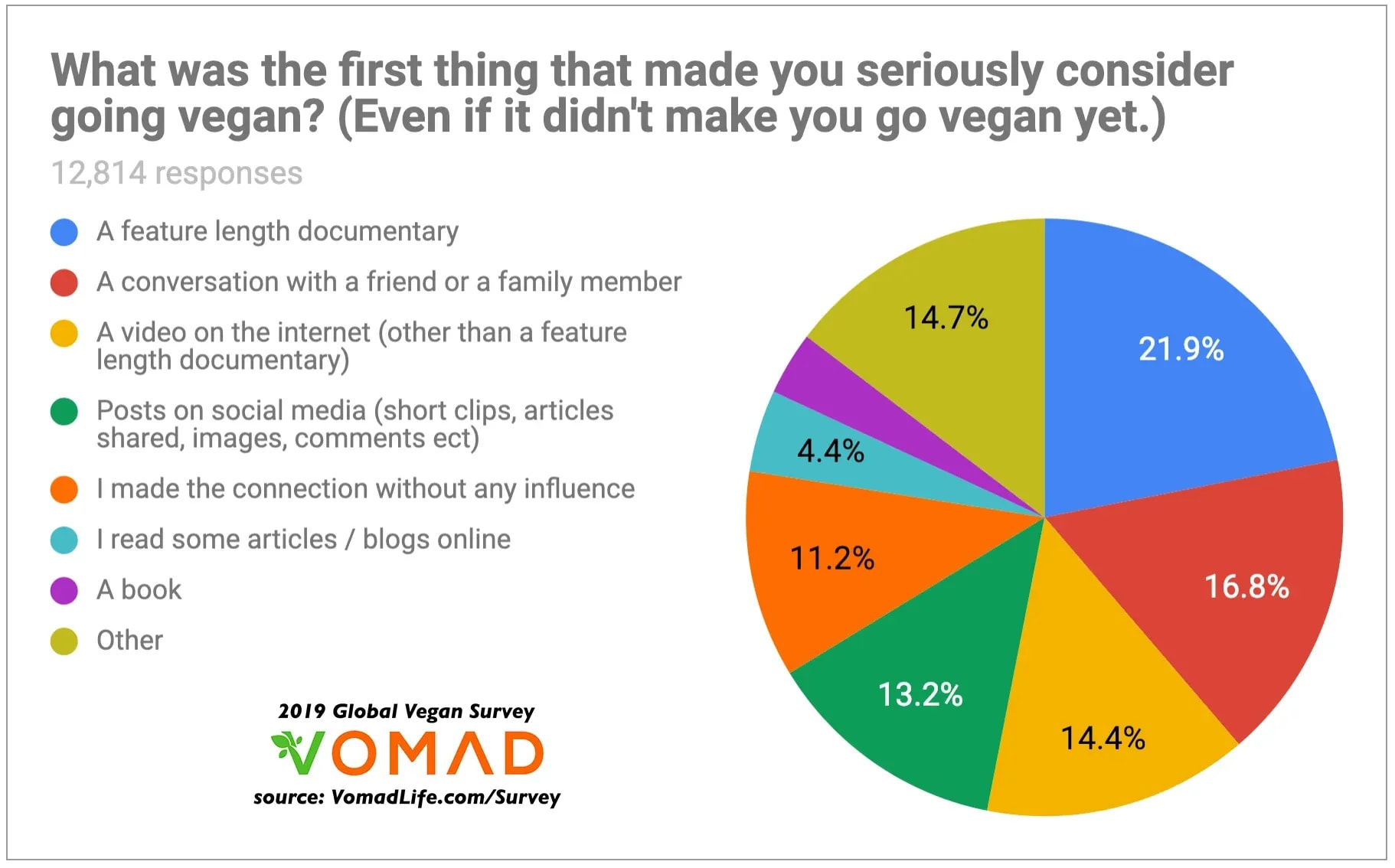
Just imagine how high that percentage would be if the average vegan interlocutor was totally shredded!
I'm kidding. Mostly.
It couldn't hurt, right?

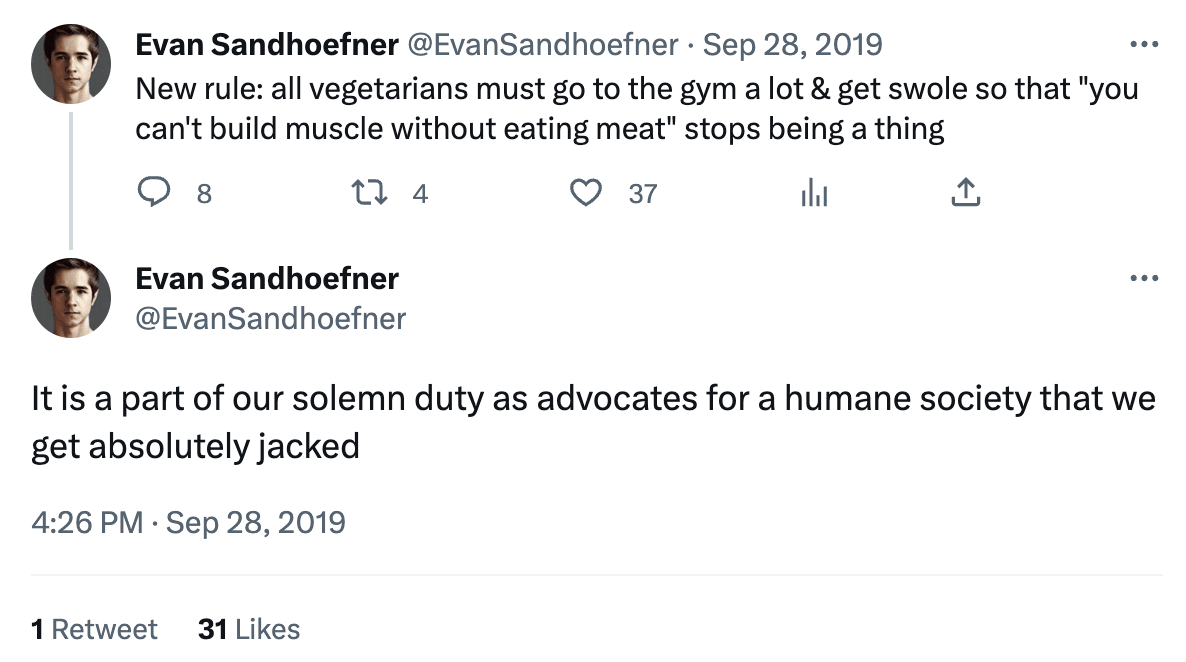
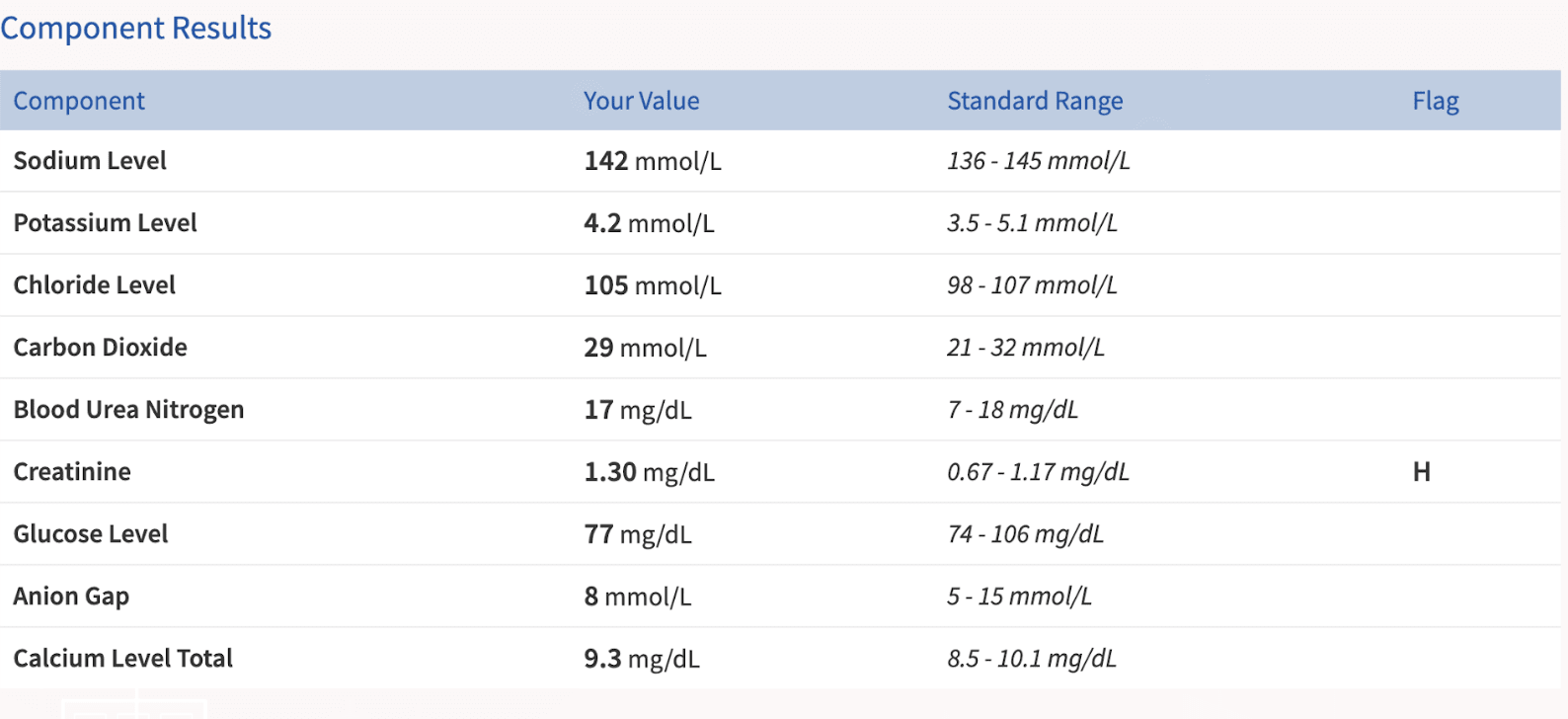
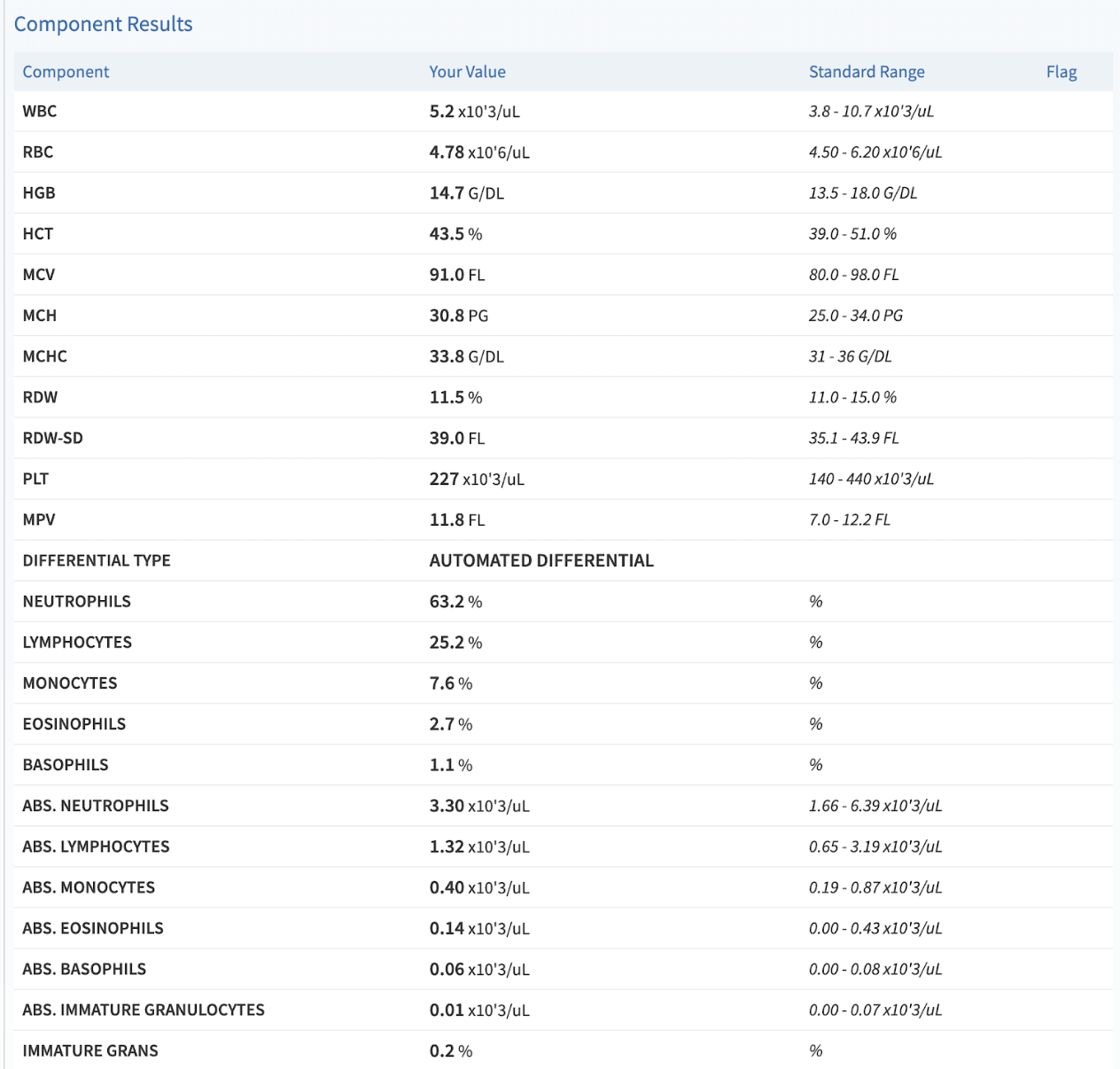
Good information and worth sharing.
I'm going to share some information about my meat-heavy diet, not because I'm trying to troll or distract from this post, but because I think there is value in trying to triangulate between the experiences of successful vegans and continued meat-eaters. The theme here is "refuting anti-vegan myths," and, on reflection, my resistance to becoming vegan comes from a different source, which I'll share in case anybody else has information that might be relevant.
I eat meat, and am currently dieting for the first time after ballooning to a near-obese 210 lbs, 5'11" during a sedentary two years in grad school eating far too much pizza. My diet essentially involves replacing grains and cheese with meat, vegetables, fruit, and low-fat yoghurt. I don't have anything like your exercise routine, so my aim has been to target high protein, low calories, and fillingness while making what food I do consume palatable and very simple.
I do think that it would be possible to get enough protein in my diet by swapping out meat for beans, tofu/seitan, and protein powder. Unfortunately, I have never eaten anything based on tofu/seitan/protein powder that's better than "edible," and it would take a lot more patience with cooking to make beans consistently delicious-enough to form the basis of a palatable diet.
When meat eaters are trolling vegans, they sometimes justify their meat consumption by saying "meat is delicious!" On reflection, I actually do think that's the explanation for why I continue to eat it - food's one of the few hedonic pleasures I can access regularly in my otherwise spartan and sober lifestyle, I hate cooking, and it's easy to make meat taste delicious while using it as the primary protein source in a healthy, balanced diet.
I also don't share the intuitive impulse to not eat meat. I've owned pets, I've watched the documentaries about factory farming, I've worked with animals on farms, I've read the essays about animal cognition, and none of that has sparked a particular intellectual or emotional impulse to not eat meat. I recognize veganism as a morally safe choice. I just viscerally care about my diet and my enjoyment of food and shared eating experiences much more.
What I've rarely or never seen are anecdotes from "reluctant vegans" - people who, despite hating vegan food, not particularly feeling passionate about veganism, not having vegan friends, and missing on the easy sharing of meat-based meals with friends and family, nevertheless have made a principled choice to be vegan over the long-term purely on the grounds that it's a morally safe choice. If I did see such anecdotes, I think that understanding why and how they made the switch might be helpful in making the switch myself. Unfortunately, I fear that promoting messages of "being vegan sucks - here's why I do it anyway" might attract fewer vegans than it drives away, if there are even any vegans who feel this way.
This largely applies to me.
When I went vegan, I wasn't well-versed in moral philosophy. I was familiar with the analogous debate around abortion. Abortion opposers often argue from marginal cases that there's no consistent dividing line between fetuses and born babies, and I considered how similar arguments from marginal cases would imply that we shouldn't kill animals for our own pleasure.
After being vegan for over a year, I stumbled across Matt Adelstein's article about how factory farming is the greatest atrocity in history. Somehow, I'd just never learned about factory farming prior to this. Veganism went from the "morally safe choice" to the overwhelmingly morally mandatory one. That, I think, is the difference between our approaches to veganism.
To me, calling veganism the "morally safe choice" is like if we have two choices: (a) burn a hundred pigs to death because it's fun to watch them running around screaming, or (b) not do that, and calling (b) the "morally safe choice". On the contrary, (a) is the choice only a psychopath would take, and (b) is the choice any person with a drop of morality or consistency would take, if they truly understood what was at stake.
Thanks for the information!
I'm curious, do you consider veganism more than "morally safe" if the meat-eater takes scrupulous care to source pasture raised and what we might call "artisanally slaughtered" meat and other animal products?
It kind of makes sense to me that veganism and being anti-abortion would go together - the points of view harmonize well. I personally have the opposite view, and think that both abortion and eating ethically raised meat are basically fine, even though many factory farming practices are apalling and there are probably some cases in which I would be disturbed by how a particular abortion played out.
I tend to think that it's a combination of extended pain, awareness of death, and a principle of granting individual liberty to a conscious, aware individual that makes it impermissible to kill, and these don't apply in the case of abortion or in the case of ethical animal farming and slaughter. However, I personally fail routinely to take fully scrupulous care to avoid factory farmed meat (although I have plans to do better starting in the fall, when that will become more logistically possible), and I also acknowledge that it's hard to be sure of where your animal products come from. Furthermore, I could be wrong about the extent of the distress of consciousness-level of even putatively ethically farmed livestock, and for these reasons, despite me thinking meat-eating is theoretically fine, I think that in practice, uncertainty makes veganism "morally safe."
Thanks for the response! I think the care required to be a "morally safe" meat eater would have to be very scrupulous indeed. Effectively, one would have to be vegan when eating food bought by others, unless they are confident that the buyer shares their philosophy of scrupulously verifying humane raising and slaughter.
I scrupulously kept kosher during my childhood and adolescence, which seems to require a similar level of effort. I almost never ate out, except at the single-digit restaurants in my town which were certified kosher. At baseball games, I had drinks but not food. I didn't eat any meals prepared at my non-religious or non-Jewish friends' houses, unless it was obviously raw (like a carrot) or in kosher packaging (like kosher snacks).
Let me tell you, that was a lot of work! Even though veganism is much more restrictive, I actually find it far easier to keep, since it's relatively easily verifiable and communicable.
I have experience with that: eating meat at home but rather strictly not at restaurants for exactly the reasons you mention: it tends to simply be almost impossible to find a restaurant that seems to serve not-crazily-mistreated animals.
Doing that as vegan-in-restaurants (instead of vegetarian-in-restaurants) is significantly more difficult, but from my experience, one can totally get used to try to remain veg* outside but non-veg* at home where one can go for food with some expectation of net positive animal lives.
Few particular related experiences:
(Then, I don't want to praise my habits; I hope I find the courage again to become more vegan sometime, as everything else feels like inflicting unacceptable suffering and/or wasting a lot of money on expensive food, and I'm not sure my 'maybe it helps my health' justifies it/there must be better ways. All my sympathy if someone calls health a bad excuse for non-veganism, but I definitely maintain, if it's not about health questions, once one gets used to avoid meat and/or animal products, it only becomes easier over time, in terms of logistics and getting to know tasty alternatives, either simply only outside or also at home)
I'm sure that it would be difficult to eliminate all unethical meat consumption, and I applaud you for trying before you went entirely veg*an. I don't have a very absolutist take on it. "Morally safe" is a relative term to me, and I don't feel like a moral disaster has occurred if I eat factory farmed meat once in a while. It's a bit like how I approached COVID safety: I will accept greater levels of harm/risk in order to enjoy a socially meaningful experience than I will in circumstances that are less meaningful. Similarly, I'll eat ethical meat at home and not worry about the origin of the meat when eating out or at a restaurant. I think that if everybody followed this policy, that would represent a radical improvement in the way we treat animals.
I guess on a broader level, I'm interested in small dietary interventions that still make a big difference in terms of decreasing one's marginal contribution to animal cruelty. It's way easier for some people to reduce meat consumption and shift toward pasture-raised meat and home-layed eggs in their home cooking than it is for them to become vegetarian/vegan or to rigorously check the origins of all meat consumed at restaurants and social occasions. That doesn't apply to everybody, of course - for some, it's more straightforward to cut out meat entirely, others are more committed to eliminating meat on ethical or compassion grounds, and still others simply can't afford meat unless it's factory-farmed, enforcing a binary choice between veg*ism or unethical meat consumption.
A third aspect is social and signaling considerations. I have a lot of respect for veg*ans such as yourself who took a principled ethical stand and fought for it despite social pressure and inconvenience. I think that can be very persuasive to some people, although unfortunately as you may have experienced, some people will be rude or frustrated by it. I think there is room for modeling multiple approaches to reducing unethical meat consumption, and one of them is the "80% is good enough" approach that I'm trying to practice. Big tent meat reduction?
Just in case it wasn't clear in my post, I am very interested in this approach as well! I applaud you for thinking along these lines. Every little bit helps. This Future Perfect article titled "the difference you make when you eat less meat" does a great job of showing how eating less meat can make a big difference in terms of animal welfare and climate concerns.
I think basically all of veganism is just degrees of this harm reduction approach. Someone like Brian Tomasik might look at my supposedly vegan lifestyle and weep, seeing that I crunch springtails underfoot when I walk in my lawn, I buy some produce that was grown with pesticides, and I buy non-vegan products for my wife and other family members.
If more people took your 80% approach there would be far fewer conscious animals tortured in tiny cages. Which would be a huge win.
Thanks for the interesting comment and dialogue!
This part stood out to me, because I had the opposite reaction:
I used to love eating meat. When I went vegan I realized I could get just as much satisfaction from any protein rich, umami-filled, sauce covered or well seasoned food. My pet theory is that what everyone mostly likes when they eat animals is the added sauces and seasonings, not the meat. Bland, unseasoned chicken breast is terrible.
But like I said in my post, I don't have a refined palate, so maybe to those with better taste buds meat really is that delightful.
For me, palatability is about texture at least as much as taste. What I've found, unfortunately, is that even the best imitation meats, like beyond burgers, certain vegan sausages, and chick'n, are in the uncanny valley of meatlike textures. I agree with you that chicken is rather bland on its own, and if an imitation chicken could nail the texture, I would probably be fine crossing over. Red meat supplies much of its own flavor, and beyond burger and its similars have yet to really approach either the texture or flavor.
I think vegan sausage might be approachable, and have the added benefit that, AFAIK, vegan sausage has no need to contain carcinogenic nitrates. Also, since a lot of sausage is either chicken or pig based, which I believe have the worst factory farming, it would be nice to eliminate meat based sausage and replace it with a vegetarian/vegan alternative. I haven't put much effort into locating the best vegan sausage, or heard much hype about it.
Surprised. Maybe worth giving it another try, looking longer for good imitations - given today's wealth of really good ones (besides admittedly a ton of bad, assuming you really need them to imitate the original so much): I've made friends taste veg* burgers and chicken nuggets and they were rather surprised when I told them post-hoc that these had not been meat. I once had to double-check with the counter at the restaurant as I could not believe what I had in my plate was really not chicken. Maybe that speaks against the fine taste of me and some, but I really find it's rather easily possible to find truly great textures too if one really cares.
Then, I personally don't know any "uncanny valley" in that domain; make it a bit more or less fake feeling, it doesn't really matter much to me, so maybe you really experience that very differently.
*I don't know/remember whether vegan or vegetarian.
"I also don't share the intuitive impulse to not eat meat. I've owned pets, I've watched the documentaries about factory farming, I've worked with animals on farms, I've read the essays about animal cognition, and none of that has sparked a particular intellectual or emotional impulse to not eat meat."
Has any of that changed the kind of meat you eat, in terms of how the animals lived and died? I do get the argument-from-deliciousness (the sheer enjoyment of really good cheese is why I'm not fully vegan despite having been happily vegetarian for >30 years), but I'd find it really hard to eat, say, something containing eggs from caged hens. The visceral horror would outweigh any good sensory feelings, for me. Do you encounter any of that?
Yes, my partner keeps chickens in the backyard, so that's the only eggs I typically eat, and we are considering buying a meat freezer and ordering shares of pasture-raised livestock instead of buying at the supermarket. I tend to think that eating meat is more or less perfectly fine as long as the animal didn't suffer excessively during its life. I think that's less of a morally safe position than not eating meat at all. I'd personally like to see more consideration (not necessarily endorsement, just consideration) within the EA movement of pasture-raised/low-meat diets as an alternative to vegetarianism and veganism. Right now I feel like there's a lot of guidance available for people going vegan/vegetarian, but not much for people trying to do ethical/low-meat diets.
I found this to be a very helpful comment. In some of the recent discussions about veg*nism, I felt most people were assuming an implied binary choice between going vegan and ratifying the factory-farming system by consuming its products. We domesticated animals over 10,000 years ago, and have been eating them for thousands of years before factory farming was a thing. How to obtain animal products without factory farming is, from a historical perspective, a solved problem.[1] For people who have sufficient financial resources and some motivation, the biggest barrier may be differentiating between companies who want you to believe their products are consistent with animal welfare and those that actually are.
To be sure, non-FF animal products are expensive, and one could achieve more impact by donating the marginal additional cost to ACE-recommended charities. However, some of us have deontologists and virtue ethicists in our moral parliament. And consuming factory-farmed products likely generates epistemic bias through cognitive dissonance (e.g., by making it harder to expand the moral circle). Moreover, the extra cost of purchasing non-FF animal products should probably be considered a personal cost of one's consumption choices, not a part of one's effective altruism. People spend their own money on stuff that isn't very effective in an EA sense (like pets), and that's fine.
Of course, non-FF animal products are generally not financially competitive with FF ones. That is not a solved problem.
Overall I have been pleasantly surprised at how constructive this conversation has been, thanks to OP for creating space for it. Generally I find ethical discussion with EAs to be pleasant, but I had anticipated there might be an exception where veg*ism is concerned.
I would add one extra point, which is that while I do think that all of life's activities come into the scope of ethics, I think it's important to preserve space to make meaningful decisions without subjecting each one to conscious ethical deliberation. By analogy, sometimes we scrutinize all the available data before we make a decision; other times, we ask an expert or a friend for their opinion and defer; and still other times, we just go with our gut. I think this also applies to ethical quesitons.
There's a perfectly good reason to elevate meat and animal product consumption to a higher level of ethical attention. But what ought our total "ethics budget" be, and what would an appropriate allocation of ethical attention be, considering all the many problems in the world? My ethics budget is relatively small, and mainly reserved for issues related to my professional work and expertise - I am interested in issues related to biomedicine because I am a professional biomedical researcher, and spend considerable time on the ethics of organ sales because that is a particularly important, tractable and neglected question to interrogate.
It seems to me that the idea that all our personal life decisions ought to be the subject of continuous moral scrutiny, or that we ought to be making "morally safe choices" in all areas of life all the time, is an overly restrictive and not very "ethically efficient" rule. So partly based on that idea, I see dietary ethics as being in the reference class of "personal life ethics," which I downweight in my ethical calculus. That's counterbalanced by the high level of suffering I have witnessed when I've watched factory farming videos, and counterbalanced again by the heavy integration into my culture and diet of meat consumption. And my current pattern of meat consumption - eating it, enjoying it, not feeling particularly guilty, but making gradual steps to phase out factory farmed meat - is the result of that balancing act.
But I would also add that I approve of people who are passionate about an ethical stance and take action to implement it in their lives, and so I applaud vegans and vegetarians, even though I do not join them. To me, it seems like there are many ways to be more virtuous in one's live, and veganism and vegetarianism are two good examples but not mandatory for everyone.
Thanks for writing and sharing this! I liked that this is a different, more personal EA Forum post than most are.
Plus this was of particular interest to me, as I've been vegan for several years, although transitioning more recently towards being lacto-vegetarian (mostly eating yogurt, ice cream, cheese) because I'm trying to be healthier but have found it hard to hit a good amount of protein.
Thanks so much for writing this!
I'm healthier and drastically stronger than before I went vegan. Very happy to talk to anyone about vegan sources of protein (or any other nutrient).
I love this post. So much so that I got up to do a set of pull-ups between reading it and writing this comment!
I'm currently 95% bivalve vegan (occasional eat some cheese and other trace dairy products when I'm out of my house). I'm the closest thing to fully plant based that most of my friends and family know. My jam has been long-distance running rather than getting strong, but some fraction of my motivation has similarly been 'be fitter than almost every meat eater they know.'
Unfortunately a running physique perpetuates the frail stereotype, so this is a good reminder to do some curls every once in a while for the animals :)
[Oh, and as an N=2 on the substance of this post: I am much healthier and fitter now than I was before going veg, but that's largely confounded by also getting more into running over the last 3 years. The increase in fitness over this period has been significant enough that I'd be surprised if eating meat would have resulted in an even greater increase.]
Excuse the delayed reply, but I wanted to make sure to say this comment made me happy!
While a running physique might perpetuate a frail stereotype to the untrained eye, I know that y'all are actually packing a very strong punch in a smaller package :)
Love this. Great workout motivation.
Great post, thanks for writing it! Healthy and active vegans sharing their stories helps change the narrative, bit by bit.
Going to chime in with a comment I haven't seen others make yet, and likely for good reason... EAs are congenial to a fault sometimes.
I used to think, as I think you are implying in your excerpts of Hanania's piece, that a full-throated agreement and recognition of the moral imperative to not consume animal products (from factory farms or elsewhere) even if one did not or had not yet chosen to take this moral circumscription upon themselves, was commendable. Hey, I thought, at least they are aware. Then I read this argument in an otherwise excellent Noah Smith piece on the horrors of factory farming and now I encounter it in Hanania. Give me someone who doesn't think about it at all, even someone mouthing that thin sophistry about moral consideration being rooted in reciprocity is preferable to this. Better to be ignorant than knowingly and contritely - and barely that - complicit.
If he was sincere, Hanania could have spent 10 minutes looking up what is by now widely known, easily accessible information about veganism and nutritional deficits. I applaud you for the having the patience to spoon-feed this to him and those with similar views, but it seems rather clear to me that his concerns about nutrition were simply the pretext nearest at hand when he wrote that piece.
I fully acknowledge many people do fine on a vegan diet, especially if they carefully supplement the way you seem to. And I'm glad you're doing well.
But if I didn't believe that, these results wouldn't change my opinion, because you didn't post the tests people are concerned about for vegans. Saying "I'm a healthy vegan- look at my cholesterol" is like saying "I'm healthy on the carnivore- look at my hemoglobin count." It's nice for you, but no one accused your diet of being bad at that.
I additionally wouldn't consider your results useful for uninformed veganism, since you're carefully supplementing. Which, TBC, is great, and it's great that you're talking about it. I think it would be good for my goals and yours for you to talk more about how you crafted a diet that worked so well for you, in accordance with your ethical principles.
Thanks for writing this piece! This motivates me to rescue a draft about "how to eat more plants and do it successfully" that has been in the works for too long. Hopefully, I will complete it soon-ish; fingers crossed!
But briefly —
I had similar concerns before going vegan. It didn't take me that long to realize that killing, consuming, and using animals the way we do is morally abhorrent. The environmental and public health issues from intensive farming were easier to buy into. But, I was unsure if I could sustain a healthy life and build muscles without eating non-humans.
I was getting into strength training back then, and I really wanted to build muscles and not have a scrawny figure anymore. Nearly all the jacked influencers on social media/YT promoted a meat-heavy diet; chicken breast and whey protein seemed like the necessary ingredients for getting lean and building muscles; vegan food was often labeled as rabbit food and thoroughly dismissed. Another subset of folks attracted my attention: people who stopped being vegan. The severity of the health problems they claimed they experienced while eating plants was alarming.
All this made me pretty hesitant to adopt a plant-only diet. I won't spend much space in this comment elaborating on how I escaped the jacked influencer memeplex or what made me skeptical of the alleged severe harms of a plant-based diet, but I am glad I did. In one line — I realized that being buff had little to do with eating or not eating a plant-based diet.
I have been vegan for three years now, and I have been able to:
I am not as jacked as you, but I am in good shape and health and pretty happy about it! At my best, I made tracking calories, nutrient intake, and strength training progress a habit. It seemed like a simple math problem, and the results were pretty deterministic. I think I would have had similar success with a plant-predominant or meat-focused diet.
Overall, I would say my experience has been "normal," and I would recommend it to the vast majority of people who want to get bigger or be in better shape.
(N=3 now!)
This is great, thanks for sharing. The jacked influencer memeplex is soooo focused on animal protein, it can be really hard to step out of that sphere of influence.
I was also highly sensitive to the reports I read from people who stopped being vegan because it didn't work for them. There's a good lesson in there about making sure to try things for myself in the real world instead of reading endless reports and then simply assuming I'd have a certain outcome.
I look forward to reading your post about eating more plants!
Hanania released a new blogpost about his diet. It seems like part of the reason for not going vegan is his lack of self control. You can eat less calories and more protein on a vegan diet than he does on a nonvegan one.
Thanks for this post, and the comments. Great to see the emotion taken out of the equation, and rational thought in its place. I fully agree that factory farming is an abomination. I'm open to vegetarianism and veganism, but not convinced they're the most morally correct action. Or whether "morals" should play into it. I do respect people's choice to look at it that way. This ties into an article of my own I've considered writing but have put off. I'm very interested in eastern philosophy. In which we accept the world as it is. Not that we don't try to make it better, but that on a certain scale, things are the way they are. Longtermism aside, I see it like this: eventually, we lose our sun, and long before that, the earth is no longer inhabitable for humans or any complex life. A world of species rises, and falls, over and over again throughout this universe and others. All the drama, the handwringing over the "right" choices etc., fades into nothing and things move on, unaware.
The fact that, as longtermism assumes, humans on earth may well be the only species capable of appreciating the full nature of life, can be taken different ways. Maybe it's just us who can appreciate the beauty of it all, and we can decide that's an important thing to protect, or decide it's an ok thing to let fade.
So...you look at nature. Killing to live. Only plants (most of them, anyway) don't need to kill to live. If you can't photosynthesize, you must kill to live. A Buddhist or Daoist (or most aboriginal groups) would see this, and conclude "this is the way of nature". It's accepted. But the fact that we must kill to eat (whether that's killing an animal or plant) creates a very important responsibility to do so ethically. Vegetarianism and veganism seem to imply that there is no way to ethically kill an animal (to overgeneralize). Killing is, by definition, unethical.
Is this an enlightened viewpoint, or a viewpoint born of a separation from nature, a separation from seeing how the natural world works?
Animals kill to live. The closer you get to nature, the less you can ignore it.
Is it sheer hubris to think we as humans can contradict the natural way of things (understanding that "natural" is a tricky concept and we regularly get it wrong), turn carnivores into herbivores, muck around with natural systems? I don't know. I know we have a terrible track record.
BUT, we as humans can think beyond all this, and there's no doubt that death involves suffering. Suffering is a fact of life, no matter how hard we attempt to avoid it. But avoiding unnecessary suffering IS something we can aspire to. We, as humans, are the only species who can decide to reduce suffering. So I can't discount vegetarianism or veganism.
To Drew's point, genetics absolutely play a role in someone's success with a certain diet. I've dug into health and nutrition deeply over the last few years, and what works for one person absolutely will not necessarily work for another. If I ate like Drew, I'd be pushing myself toward type II diabetes and have a ton of inflammation. But his biomarkers show above average health (though, especially in the West, "average" is a low bar). Clearly being vegan is working for him. I agree that with supplementation and very careful choices in diet, we can reduce suffering by not eating animals.
On a philosophical level, I'm not convinced we know what's "right". I think raising and slaughtering animals ethically is, if nothing else, the next step. Abolish factory farming (90% of my food choices (I hunt, I buy pasture raised)) align with this ideal. Whether or not it's a step towards discontinuing animal consumption completely. To be sure, if our population growth continues (and I'm not an advocate for population control, at least in any form I've seen it proposed), "real" meat consumption can't continue. It'll have to be lab-grown. But I do long for, let's say half our current world population, fed by local farms practicing regenerative agriculture. Without animals pooping on fields, crops need artificial fertilizer, and the type of giant monocropping necessary to feed giant human populations requires chemical fertilizer, chemical pesticide and insecticide, pushing us toward ecological collapse. I'm just not sure how this whole things plays out...